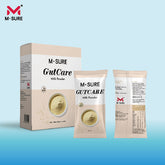What Foods can Regulate Emotions?
by
BiotechAusway
14 Jun 2025
Core Mood-Regulating Nutrients & Food Sources
Omega-3 Fatty Acids
-
Mechanism: Reduces neuroinflammation, enhances neurotransmitter conduction
-
Sources: Salmon (150g/serving), flaxseeds (1 tbsp), walnuts (6–8 pieces)
-
Guide: Aim for at least 2 servings of fish per week
Tryptophan
-
Mechanism: Precursor for serotonin synthesis, helps stabilize mood
-
Sources: Turkey breast, pumpkin seeds (30g), banana (1 medium), unsweetened yogurt (200ml)
-
Guide: Combine with carbohydrates at each meal for better absorption
Magnesium
-
Mechanism: Modulates stress hormones, relaxes neuromuscular tension
-
Sources: Dark chocolate (70% cocoa, 30g), cooked spinach (80g), almonds (20 pieces)
-
Guide: 300–400 mg per day
B Vitamins
-
Mechanism: Supports neurotransmitter metabolism, combats fatigue
-
Sources: Whole-wheat bread (2 slices), avocado (½), organ meats (100g/week)
-
Guide: Vitamin B12 intake should be ≥ 2.4 μg/day
Functional Food Synergy Strategies
Rapid Anxiety Relief Combos
-
Mid-morning snack:
Banana (1 medium) + Walnuts (5 pieces)
→ Combines tryptophan and omega-3s for mood stability -
Afternoon tea:
Dark chocolate (70% cocoa, 20g) + Unsweetened matcha latte
→ Magnesium and L-theanine blend for a calming effect
Mood-Disrupting Foods to Limit
High-Refined Sugar
-
Examples: Cakes, sugary drinks
-
Effect: Causes blood sugar spikes, leading to mood swings
Trans Fats
-
Examples: Fried foods, margarine
-
Effect: Promotes neuroinflammation
Excess Caffeine
-
Examples: Espresso (more than 3 cups/day)
-
Effect: Triggers anxiety and disrupts sleep
Key Implementation Principles
-
Gut-Brain Axis Optimization:
Include daily fermented foods (e.g., kimchi, yogurt, kombucha) for 4 weeks to improve stress resilience by up to 30%. -
Eating Rhythm:
Eat protein and healthy fats every 3–4 hours to prevent blood sugar dips that can lead to irritability. -
Avoid This Combo:
Sugary foods combined with caffeine may double your risk of anxiety.






